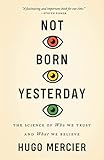Not Born Yesterday : The Science of Who We Trust and What We Believe / Hugo Mercier.
Material type: TextPublisher: Princeton, NJ : Princeton University Press, [2020]Copyright date: ©2020Description: 1 online resource (384 p.) : 4 b/w illusContent type:
TextPublisher: Princeton, NJ : Princeton University Press, [2020]Copyright date: ©2020Description: 1 online resource (384 p.) : 4 b/w illusContent type: - 9780691178707
- 9780691198842
- 153.85/2 23
- HM1196
- online - DeGruyter
- Issued also in print.
| Item type | Current library | Call number | URL | Status | Notes | Barcode | |
|---|---|---|---|---|---|---|---|
 eBook
eBook
|
Biblioteca "Angelicum" Pont. Univ. S.Tommaso d'Aquino Nuvola online | online - DeGruyter (Browse shelf(Opens below)) | Online access | Not for loan (Accesso limitato) | Accesso per gli utenti autorizzati / Access for authorized users | (dgr)9780691198842 |
Browsing Biblioteca "Angelicum" Pont. Univ. S.Tommaso d'Aquino shelves, Shelving location: Nuvola online Close shelf browser (Hides shelf browser)

|

|

|

|

|

|

|
||
| online - DeGruyter Creating a Constitution : Law, Democracy, and Growth in Ancient Athens / | online - DeGruyter Korngold and His World / | online - DeGruyter Escape from Rome : The Failure of Empire and the Road to Prosperity / | online - DeGruyter Not Born Yesterday : The Science of Who We Trust and What We Believe / | online - DeGruyter Meeting Globalization's Challenges : Policies to Make Trade Work for All / | online - DeGruyter Give and Take : Developmental Foreign Aid and the Pharmaceutical Industry in East Africa / | online - DeGruyter Livy : The Composition of His History / |
Frontmatter -- CONTENTS -- LIST OF ILLUSTRATIONS -- ACKNOWLEDGMENTS -- INTRODUCTION -- 1. THE CASE FOR GULLIBILITY -- 2. VIGILANCE IN COMMUNICATION -- 3. EVOLVING OPEN-MINDEDNESS -- 4. WHAT TO BELIEVE? -- 5. WHO KNOWS BEST? -- 6. WHO TO TRUST? -- 7. WHAT TO FEEL? -- 8. DEMAGOGUES, PROPHETS, AND PREACHERS -- 9. PROPAGANDISTS, CAMPAIGNERS, AND ADVERTISERS -- 10. TITILLATING RUMORS -- 11. FROM CIRCULAR REPORTING TO SUPERNATURAL BELIEFS -- 12. WITCHES' CONFESSIONS AND OTHER USEFUL ABSURDITIES -- 13. FUTILE FAKE NEWS -- 14. SHALLOW GURUS -- 15. ANGRY PUNDITS AND SKILLFUL CON MEN -- 16. THE CASE AGAINST GULLIBILITY -- NOTES -- REFERENCES -- INDEX
restricted access online access with authorization star
http://purl.org/coar/access_right/c_16ec
Why people are not as gullible as we thinkNot Born Yesterday explains how we decide who we can trust and what we should believe-and argues that we're pretty good at making these decisions. In this lively and provocative book, Hugo Mercier demonstrates how virtually all attempts at mass persuasion-whether by religious leaders, politicians, or advertisers-fail miserably. Drawing on recent findings from political science and other fields ranging from history to anthropology, Mercier shows that the narrative of widespread gullibility, in which a credulous public is easily misled by demagogues and charlatans, is simply wrong.Why is mass persuasion so difficult? Mercier uses the latest findings from experimental psychology to show how each of us is endowed with sophisticated cognitive mechanisms of open vigilance. Computing a variety of cues, these mechanisms enable us to be on guard against harmful beliefs, while being open enough to change our minds when presented with the right evidence. Even failures-when we accept false confessions, spread wild rumors, or fall for quack medicine-are better explained as bugs in otherwise well-functioning cognitive mechanisms than as symptoms of general gullibility.Not Born Yesterday shows how we filter the flow of information that surrounds us, argues that we do it well, and explains how we can do it better still.
Issued also in print.
Mode of access: Internet via World Wide Web.
In English.
Description based on online resource; title from PDF title page (publisher's Web site, viewed 26. Mai 2021)


